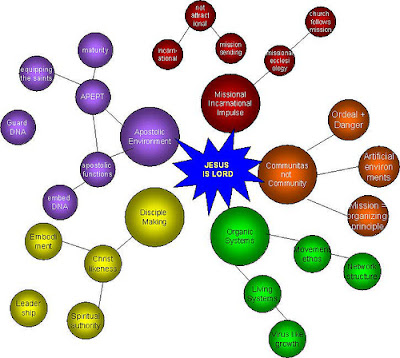
I found this to be a very good book, although it had one or two very irritating flaws, not the least of which was an astonishingly inane jacket-quote from someone called Leonard Sweet, which would have prevented me from buying the book if I had seen it beforehand.
But that’s a cavil. This is an excellent book about mission; one that I will almost certainly be sharing with the wider leadership team here. It’s had quite an impact on me, not least in providing ‘the fourth thing’… I’ve often thought that (following Eugene Peterson’s analysis) there were three things in my ministry that I felt called to concentrate on: celebrating communion; teaching and preaching; and spiritual direction. However, I’ve also felt that there was a ‘fourth thing’ that was in me and that didn’t quite fit with this – and I’ve variously called it management, or leadership, or even (before I came to Mersea and decided against doing a PhD) ‘the Civil Service element’ in my character. What this book has done for me – and for which I am profoundly grateful – is given me a different description of this element, and one, moreover, which gives me great peace. It is the apostolic element. Hirsch quotes Steve Addison saying:
“The apostolic role within established churches and denominations requires the reinterpreting of the denomination’s foundational values in the light of the demands of its mission today. The ultimate goal of these apostolic leaders is to call the denomination away from maintenance, back to mission. The apostolic denominational leader needs to be a visionary, who can outlast significant opposition from within the denominational structures and can build alliances with those who desire change. Furthermore, the strategy of the apostolic leader could involve casting vision and winning approval for a shift from maintenance to mission. In addition, the leader has to encourage signs of life within the existing structures and raise up a new generation of leaders and churches from the old. The apostolic denominational leader needs to ensure the new generation is not “frozen out” by those who resist change. Finally, such a leader must restructure the denomination’s institutions so that they serve mission purposes.”
In a week of great and diverse stresses it has been very healing and heartening to read that.
There were two other elements that really resonated with me: the first, that the apostolic call isn’t about pastoring as commonly understood: ‘in actual practice, a predominantly pastoral conception of the church and ministry now actually constitutes a major hindrance to the church reconceiving itself as a missional agency’. The second, that the apostle is first and foremost a working theologian, one who safeguards the ‘DNA’ of the Christian faith. That is precisely what I have seen as most essential in my ministry so far, and the source of all the positive things that have followed (such as there have been).
A final long quotation (from Karl Barth, which the book ends with):
It is certain that we all have reason to ask ourselves each of these questions and in every case quickly and clearly to give the answer:
No, the church’s existence does not always have to possess the same form in the future that it possessed in the past as though this were the only possible pattern;
No, the continuance and victory of the cause of God, which the Christian Church is to serve with her witness, is not unconditionally linked with the forms of existence which it has had until now;
No, the hour may strike, and perhaps already has struck, when God, to our discomfiture, but to his glory and for the salvation of mankind, will put an end to this mode of existence because it lacks integrity;
Yes, it could be our duty to free ourselves inwardly from our dependency on that mode of existence even while it still lasts. Indeed, on the assumption that it may one day entirely disappear, we definitely should look about us for new ventures in new directions.
Yes, as the Church of God we may depend on it that if only we are attentive, God will show us such new ways as we can hardly anticipate now. And as the people who are bound to God, we may even now claim unconquerable security for ourselves through him. For his name is above all names….
Amen. Praise the Lord!
